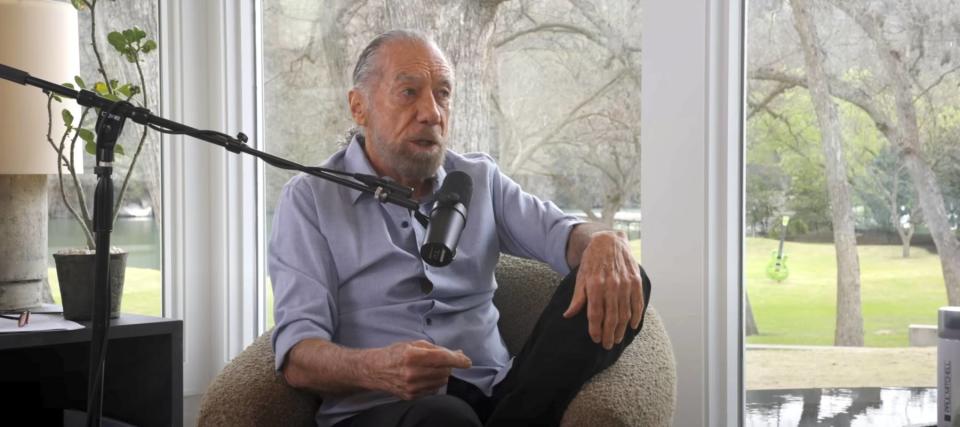'I learned how to live off of $2.50 a day': Founder of Paul Mitchell hair products and Patron tequila went from homeless and eating 99-cent breakfasts to owning 2 global empires

John Paul DeJoria is known for global empires John Paul Mitchell Systems and The Patron Spirits Company. But on his way to founding these brands and becoming a billionaire, he was homeless and living out of his car, he told entrepreneur Noah Kagan on his podcast “Noah Kagan Presents.”
“I learned how to live off of $2.50 a day,” he said.
Don't miss
Commercial real estate has outperformed the S&P 500 over 25 years. Here's how to diversify your portfolio without the headache of being a landlord
Inflation is still white-hot in 2024 — use these 3 'real assets’ to protect your wealth today, no matter what the US Fed does or says
Anything can happen in 2024. Try these 5 easy money hacks to help you make and save thousands of dollars in the new year (they will only take seconds)
While he was working as a salesperson and consultant in the beauty industry, DeJoria became pals with renowned hair stylist Paul Mitchell. In 1980, they decided to start a business together creating and selling hair products, but their investor backed out after getting cold feet.
Anticipating a surge in cash (that never came), DeJoria says he quit his job and set aside money for his wife and daughter at the time. Suddenly he was broke, and too proud to admit it. He ended up getting help from his mom, who loaned him $300, and slept in his car while he learned to live off a couple of bucks a day eating diner specials for 99 cents. All while he sold shampoo door-to-door.
Today, Paul Mitchell is one of the most recognized hair care brands in the world. Along with a portfolio of more than 150 products, there are more than 100 Paul Mitchell beauty schools and a network of 50,000 salons in 80 countries.
“It was a perfect relationship,” DeJoria said of his partnership with Mitchell, who died in 1989. “I didn’t do hair and he didn’t do any business.”
But the key to their success was that “we made a hell of a good product,” DeJoria said. “You don’t want to be in the selling business, you want to be in the reorder business.”
The Patron origin story
When DeJoria’s friend Martin Crowley came back from a trip to Mexico, he brought with him a nondescript bottle of tequila with a horseshoe on it.
“I thought, ‘Wow, that’s the smoothest tequila I’ve ever had — you could actually sip this.’”
Crowley, however, had come across a master distiller, Francisco Alcaraz, who he thought could make it even better. DeJoria decided to bankroll production, ordering 1,000 cases (that’s 12,000 bottles). And that’s what led to Patron.
But, back then, “nobody wanted the product,” DeJoria said. This was in 1989, when a bottle of tequila typically cost a few dollars. Patrón, on the other hand, was selling for $37.95.
Read more: Thanks to Jeff Bezos, you can now cash in on prime real estate — without the headache of being a landlord. Here's how
Then he walked into Spago in Beverly Hills. Celebrity chef Wolfgang Puck was a friend, and DeJoria asked if he’d serve it to his celebrity guests. Before he knew it, stars like Bruce Springsteen were requesting cases of Patron.
The business grew from there, and Patron was sold to Bacardi in 2018 for $5.1 billion.
When Patron was sold to Bacardi in 2018 for $5.1 billion, the company was approaching sales of 4 million cases a year, according to DeJoria.
Getting unstuck
Even when DeJoria was sleeping in his car and living off loose change, he maintained a positive attitude.
You shouldn’t focus on how bad things are, he says, “because that’s yesterday’s newspaper — if you do that, you’re stuck in the past.”
Since you can’t change yesterday’s newspaper, he recommends looking ahead at “who do I call next, how do I make another sale.” No matter how many times you’re rejected, “keep your eye on the target.”
After he started making good money, DeJoria went back to one of the restaurants where he used to eat for 99 cents and “tipped everyone in that restaurant the biggest tips they’ve ever had in their life for helping me out when I needed a helping hand.”
That’s a key ingredient to his success: kindness. DeJoria has learned over the years “just how wonderful kindness is,” founding JP’s Peace, Love & Happiness Foundation — which supports a variety of philanthropic causes — to continue giving back.
What to read next
Rich young Americans have lost confidence in the stock market — and are betting on these 3 assets instead. Get in now for strong long-term tailwinds
Jeff Bezos and Oprah Winfrey invest in this asset to keep their wealth safe — you may want to do the same in 2024
Credit card debt under inflation's shadow: The 4 potent weapons you need to have for a strong financial resurgence
This article provides information only and should not be construed as advice. It is provided without warranty of any kind.

 Yahoo Finance
Yahoo Finance 